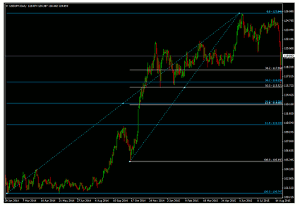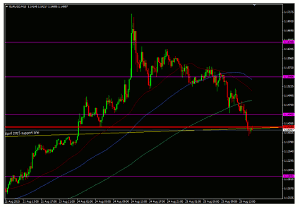Ryan Littlestone, of ForexLive.com, points out the three main stages to the moves forex traders have seen this week and illustrates why following some simple trading rules can make it the difference between feeling like you're in the middle of a tornado and being in control.
On Monday, I spoke about almost ignoring the tech for the price action but what do we do after riding rough seas?
There are three main stages to the types of moves we've been seeing:
- What we do when they look like happening?
- What we do while they're happening?
- What we do after they happen?
What Do We Do When They Look Like Happening?
It's advisable to pull ourselves out from the lower time frames and look at the higher ones. Forget the short-term tech and look at the longer-term stuff. They hold greater strength in my experience and provide a lower risk way to trade outside of the intraday noise.
Let's take USD/JPY and the fibs I highlighted Monday.

USD/JPY Daily Chart
Click
to Enlarge
Any of those first three fibs were tradable. Of course, having the guts to do it when the proverbial is hitting the fan is the key. Also, I don't think there were many of us who thought we'd see such volatile moves anyway, so who's going to stick an order in 300-500 pips below the market just in case we get a move like that? The main point is that if you have the tech levels drawn up there's no reason why you can't trade them. You've reduced the noise and could get yourself into a very healthy trade.
What Do We Do While They Are Happening?
This is the stage I highlighted Monday with the Dow. Now we can come down to the lower time frames. Take a blank page and let the price action build the tech for you. Let it show you where the market is buying and selling and when you've built up a good enough picture you have your levels to trade. There's no need to be a hero but you have your lower risk entry points, your levels to lean against. Trading doesn't get much more live than watching a 5- or 10-minute chart and deciphering the price action where moves are much bigger than normal.
What Do We Do After?
Can we get back to normal? That's what we need to look for. The normal intraday/short-term tech may have been blown out of the water, but now it's time to see how much of it reasserts itself.
1.1450 was level I was looking at in EUR/USD Monday just before it all kicked off. Tuesday we tested it and bounced over 50 pips, then held it for a while before breaking. We've now seen Monday's low support taken out and become resistance.

EUR/USD 15m Chart
Click
to Enlarge
Slowly, the short-term tech comes back into play. Plenty of caution is still needed but we can start to move back to trading normally as the dust settles.
Reacting to markets is all part of trading, but once again, having some simple rules can make it the difference between feeling like you're in the middle of a tornado and being in control.
By Ryan Littlestone of ForexLive.com










